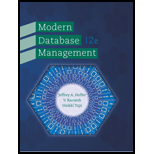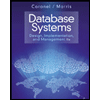
Concept explainers
Add the following to Figure 3-16: An EMPLOYMENT party relationship is further explained by the positions and assignments to positions during the time a person is employed. A position is defined by an organization unit, and a unit may define many positions over time. Over time, positions are assigned to various employment relationships (i.e., somebody employed by some organization unit is assigned a particular position). For example, a position of Business Analyst is defined by the Systems Development organization unit. Carl Gerber, while employed by the Data Warehousing organization unit, is assigned the position of systems analyst. In the spirit of universal data modeling, enhance Figure 3-16 for the most general case consistent with this description.
Want to see the full answer?
Check out a sample textbook solution
Chapter 3 Solutions
Modern Database Management (12th Edition)
Additional Engineering Textbook Solutions
Starting Out with Python (4th Edition)
SURVEY OF OPERATING SYSTEMS
Database Concepts (8th Edition)
Electric Circuits. (11th Edition)
Automotive Technology: Principles, Diagnosis, And Service (6th Edition) (halderman Automotive Series)
HEAT+MASS TRANSFER:FUND.+APPL.
- Ninth Edition Determine Zi, Zo and Av 20 V Zi + 1 ΜΩ 2 ΚΩ HH Z IDSS= 6MA Vp=-6V Yos = 40μS 20 and 47arrow_forwardWhat is the worst case time complexity of the following algorithm for i = 1 to x do for j = 2^((i-1)x) to 2^(in) do print(i,j)arrow_forwardProve for each pair of expression f(n) and g(n) whether f(n) is big O, little o Ω,ω or Θ of g(n). For each case it is possible that more than one of these conditions is satisfied:1. f(n) =log(n2^n), g(n) = log(sqrt(n)2^(n^2))2. f(n) =nsqrt(n) +log(n^n), g(n) =n + sqrt(n)lognarrow_forward
- I need to make a parallel version of this sequential codearrow_forwardI need to make a parallel version of this sequential code.arrow_forwardBenefits of using arrays as instance variables: What are the advantages of incorporating arrays as instance variables within a class? Initializing and managing arrays: How do you initialize and manage arrays within class constructors and mutators (setters)? Example of using arrays as instance variables: Share an example where you have used arrays as instance variables and discuss its application in a real-world scenario. Common mistakes with arrays as instance variables: What are some common mistakes to avoid when working with arrays as instance variables? Information hiding violations: What is the potential violation of information hiding when using arrays as instance variables? How can this be resolved?arrow_forward
- Do you think that computers should replace teachers? Give three references with your answer.arrow_forwardIs online learning or face to face learning better to teach students around the around the world? Give reasons for your answer and provide two references with your response. What are benefits of both online learning and face to face learning ? Give two references with your answer. How does online learning and face to face learning affects students around the world? Give two references with your answer.arrow_forwardExplain Five reasons if computers should replace teachers. Provide three references with your answer. List three advantages and three disadvantages face to face learning and online learning may have on children. Provide two references with your answer.arrow_forward
- You were requested to design IP addresses for the following network using the address block 10.10.10.0/24. Specify an address and net mask for each network and router interfacearrow_forwardFor the following network, propose routing tables in each of the routers R1 to R5arrow_forwardFor the following network, propose routing tables in each of the routers R1 to R5arrow_forward
 C++ for Engineers and ScientistsComputer ScienceISBN:9781133187844Author:Bronson, Gary J.Publisher:Course Technology Ptr
C++ for Engineers and ScientistsComputer ScienceISBN:9781133187844Author:Bronson, Gary J.Publisher:Course Technology Ptr Principles of Information Systems (MindTap Course...Computer ScienceISBN:9781305971776Author:Ralph Stair, George ReynoldsPublisher:Cengage Learning
Principles of Information Systems (MindTap Course...Computer ScienceISBN:9781305971776Author:Ralph Stair, George ReynoldsPublisher:Cengage Learning
 Principles of Information Systems (MindTap Course...Computer ScienceISBN:9781285867168Author:Ralph Stair, George ReynoldsPublisher:Cengage Learning
Principles of Information Systems (MindTap Course...Computer ScienceISBN:9781285867168Author:Ralph Stair, George ReynoldsPublisher:Cengage Learning Database Systems: Design, Implementation, & Manag...Computer ScienceISBN:9781305627482Author:Carlos Coronel, Steven MorrisPublisher:Cengage Learning
Database Systems: Design, Implementation, & Manag...Computer ScienceISBN:9781305627482Author:Carlos Coronel, Steven MorrisPublisher:Cengage Learning Database Systems: Design, Implementation, & Manag...Computer ScienceISBN:9781285196145Author:Steven, Steven Morris, Carlos Coronel, Carlos, Coronel, Carlos; Morris, Carlos Coronel and Steven Morris, Carlos Coronel; Steven Morris, Steven Morris; Carlos CoronelPublisher:Cengage Learning
Database Systems: Design, Implementation, & Manag...Computer ScienceISBN:9781285196145Author:Steven, Steven Morris, Carlos Coronel, Carlos, Coronel, Carlos; Morris, Carlos Coronel and Steven Morris, Carlos Coronel; Steven Morris, Steven Morris; Carlos CoronelPublisher:Cengage Learning





